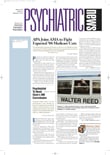It is not only those with borderline personalities who intentionally injure themselves without apparent suicidal intent, a new study shows. Persons who possess certain traits associated with other types of personality disorder do so as well. In fact, if these various traits are pooled, they might constitute a deliberate self-harm personality.
The study was conducted by three University of Virginia researchers—E. David Klonsky, a psychology doctoral student; Thomas Oltmanns, Ph.D., a professor of psychology and psychiatric medicine; and Eric Turkheimer, Ph.D., a professor of psychology and director of clinical training. Results of the study were published in the August American Journal of Psychiatry.
Klonsky and his coworkers selected as subjects for their study some 2,000 Air Force recruits. The recruits were on average 20 years of age, 62 percent were men, and nearly all were high school graduates and would eventually receive assignments as military police, mechanics, computer technicians, or other support-service personnel. The recruits also went through basic training together in “flight” groups, so that recruits in a given flight spent almost all of their time together and got to know each other quite well.
The 2,000 subjects were given the Beck Depression Inventory and the Beck Anxiety Inventory to learn whether they were depressed or anxious, and the Schedule for Nonadaptive and Adaptive Personality to learn what kinds of personality traits they possessed and whether they had ever engaged in self-harm. The subjects were also asked to use an instrument called the Peer Inventory of Personality Disorders to describe the personality traits of subjects who were in their particular flights and whom they knew well. Klonsky and his colleagues then analyzed inventory and schedule results for all of the subjects.
After that, the researchers determined the percentage of subjects who endorsed either one or both of the self-harm items in the Schedule for Nonadaptive and Adaptive Personality. The item “When I get very tense, hurting myself physically somehow calms me down” was endorsed by 2.5 percent of the men and by 2.4 percent of the women. The item “I have hurt myself on purpose several times” was endorsed by 2.5 percent of the men and by 1.7 percent of the women. Some 4 percent of all subjects endorsed at least one of these items; less than 1 percent endorsed both.
Next, to get a better idea of why people engage in deliberate self-harm, the investigators compared schedule and inventory results from subjects who reported that they had engaged in deliberate self-harm with the schedule and inventory results from those who had not.
Both depression and anxiety scores were found to be significantly higher in self-harmers than in those who didn’t harm themselves. But the link between depression and self-harm was considerably smaller when the effects of anxiety were taken into consideration. Thus, self-harmers appeared to be more anxious than depressed.
Subjects with a history of deliberate self-harm were also found to report substantially more personality pathology than those without such a history, and this pathology consisted of certain features present in various DSM-IV personality disorders.
Further, self-harmers were discovered to be perceived by their peers as exhibiting features that are typical not just of borderline personality, but also of schizotypal, dependent, and avoidant personalities. The features were feeling empty inside, acting strangely in response to stress, showing emotional responses that are strange or out of sync, not trusting other people, being afraid of being left alone to care for oneself, and worrying that other people will reject him or her.
“Our results support the DSM-IV classification of deliberate self-harm as a symptom of borderline personality disorder,” Klonsky and his coworkers wrote in their study report, “but also indicate that self-harm may be present in individuals with other personality disorders.” In fact, if the features that describe self-harmers are pooled, they might constitute a self-harm personality, the investigators believe.
Still to be answered, of course, is why even someone with a self-harm personality chooses to engage in self-harm. Klonsky has now launched another study to answer that question, he told Psychiatric News. So far, he said, he has interviewed 24 subjects to find out why they engage in self-harm, and preliminary results suggest that the reason is to release emotional pressure that builds up in them. Specifically, the most common emotions endorsed as being present right before a self-harm act are “anxious,” “frustrated,” and “hurt emotionally,” whereas the most common emotions endorsed as being presently immediately after a self-harm act are “relaxed,” “calm,” and “relieved.”
The investigation conducted by Klonsky, Oltmanns, and Turkheimer was funded by the National Institute of Mental Health.
Am J Psychiatry 2003 160 1501
